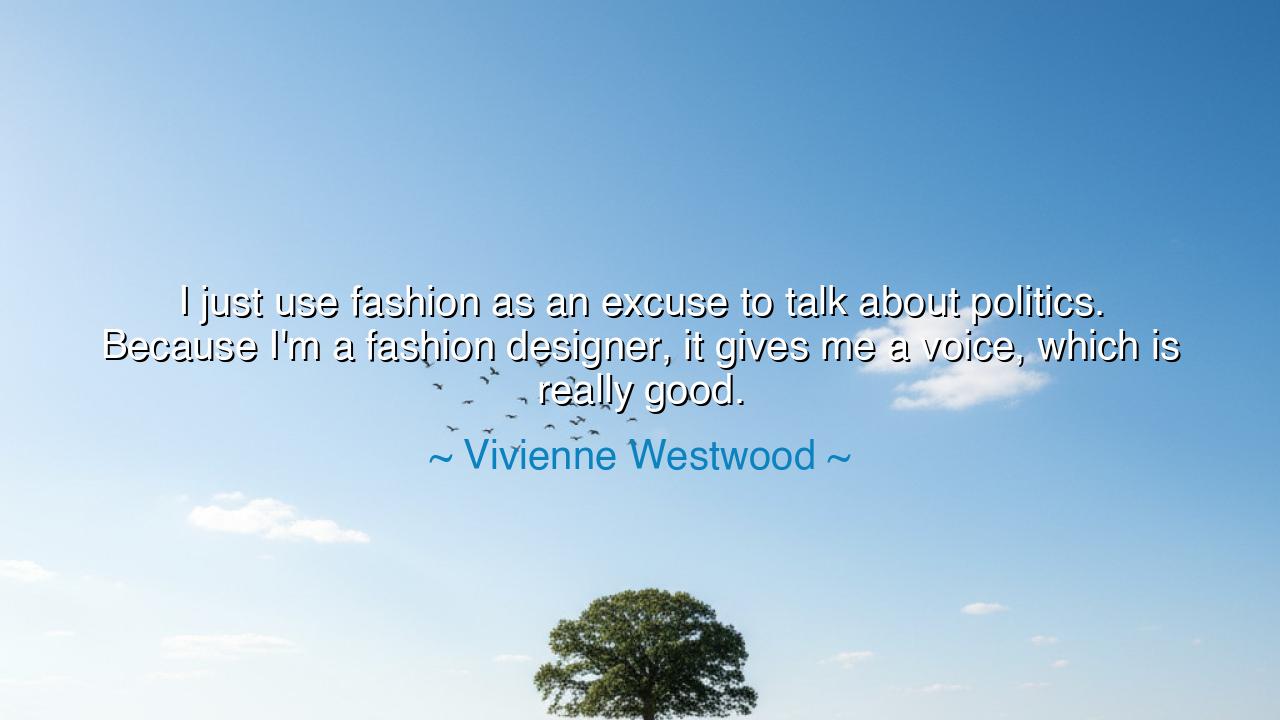
I just use fashion as an excuse to talk about politics. Because
I just use fashion as an excuse to talk about politics. Because I'm a fashion designer, it gives me a voice, which is really good.






Hear, O children of vision, the daring words of Vivienne Westwood: “I just use fashion as an excuse to talk about politics. Because I'm a fashion designer, it gives me a voice, which is really good.” In this proclamation shines the fire of an artist who knew that fashion was not only cloth and color, but language itself. For she saw that every garment carries meaning, every style a message, and that in the drapery of culture lies the chance to challenge the powers of the age.
For in truth, politics does not live only in councils and assemblies, but in the very ways people clothe themselves, mark their bodies, and walk the streets. Westwood, mother of punk and rebel of design, wove her rebellion into fabric, using torn shirts, chains, and defiant symbols to awaken the slumbering spirit of resistance. Her voice, she knew, would reach ears closed to speeches, because fashion speaks where words cannot—on the skin itself.
Consider the story of the sans-culottes during the French Revolution. By rejecting the aristocrat’s breeches and wearing the trousers of the working man, they proclaimed their defiance more powerfully than any pamphlet. Their fashion was politics, and their clothing became their flag. Westwood’s vision is heir to this truth: that the garments we wear are banners, and that designers, if they choose, become prophets with thread.
So too in the age of civil rights, when leaders like the Black Panthers donned leather jackets, berets, and dark glasses. These were not mere garments but armor, proclaiming strength, unity, and resistance to oppression. In such examples we see that fashion, far from trivial, is a stage upon which identity and power are displayed. Westwood, with wit and fire, claimed this stage to speak of politics, injustice, and the possibility of change.
Therefore, O heirs of tomorrow, do not dismiss the power of cloth. For while a law may be written in a book, a garment is written upon the body and read by every eye. Westwood’s wisdom is this: that the designer can be as mighty as the orator, and that every stitch may hold within it the seed of rebellion. To wear is to speak, and to design is to lead.






LVLe Li Vai
Vivienne Westwood's quote makes me think about the growing trend of brands and artists using their platforms for social and political causes. But is there a danger that we might start to see political statements as marketing tactics? When fashion becomes too closely tied to politics, does it risk alienating consumers who might prefer to escape into style rather than engage in societal debates? Where’s the line between artistic expression and consumer manipulation?
NVNgoc Vy
The notion of using fashion as an excuse to discuss politics is clever and certainly innovative. But it also raises the question of whether fashion risks becoming too politicized. When does artistic expression in fashion become less about creativity and more about preaching a political agenda? Can we still appreciate fashion purely for its beauty, or do we automatically associate it with social and political views?
TQtinh· qna·
Westwood’s comment highlights the intersection between art, fashion, and politics, which is intriguing. However, I wonder if this approach is only effective for certain audiences. Are those who follow fashion really the ones most in need of political discourse? Or does fashion serve more as a vehicle for those already engaged in these conversations? Can fashion bridge the gap between political awareness and action, or is it just another form of escapism?
MQTran Nguyen Minh Quan
Fashion as a means of political discourse is a fascinating idea. Westwood uses her platform as a designer to voice her views, but how accessible is this for others in the industry? Are there limitations to using fashion as a political tool, considering that not everyone has the same influence or resources as Westwood? How can fashion designers from different backgrounds leverage this power for social change?
TNThuong Nguyen
Vivienne Westwood seems to be making an important point about the power of fashion as a platform for political expression. But does this mean that fashion can be more than just style, becoming a tool for social change? How effective can fashion really be in influencing political discourse, and does this approach risk trivializing serious political issues by using aesthetics as a form of communication?